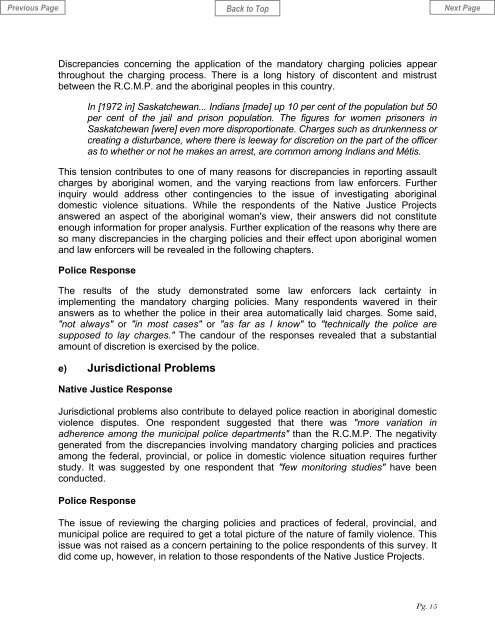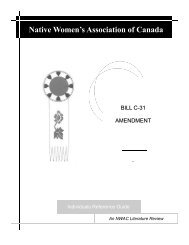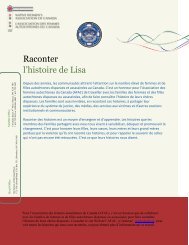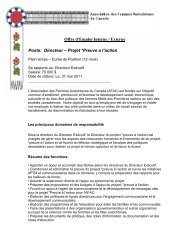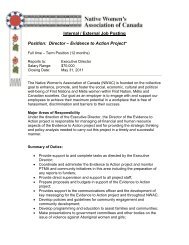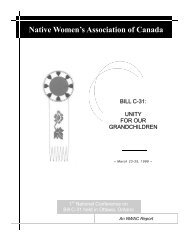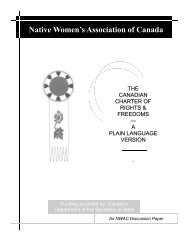POLICE CHARGING POLICIES & DOMESTIC VIOLENCE - Native ...
POLICE CHARGING POLICIES & DOMESTIC VIOLENCE - Native ...
POLICE CHARGING POLICIES & DOMESTIC VIOLENCE - Native ...
- No tags were found...
Create successful ePaper yourself
Turn your PDF publications into a flip-book with our unique Google optimized e-Paper software.
Discrepancies concerning the application of the mandatory charging policies appearthroughout the charging process. There is a long history of discontent and mistrustbetween the R.C.M.P. and the aboriginal peoples in this country.In [1972 in] Saskatchewan... Indians [made] up 10 per cent of the population but 50per cent of the jail and prison population. The figures for women prisoners inSaskatchewan [were] even more disproportionate. Charges such as drunkenness orcreating a disturbance, where there is leeway for discretion on the part of the officeras to whether or not he makes an arrest, are common among Indians and Métis.This tension contributes to one of many reasons for discrepancies in reporting assaultcharges by aboriginal women, and the varying reactions from law enforcers. Furtherinquiry would address other contingencies to the issue of investigating aboriginaldomestic violence situations. While the respondents of the <strong>Native</strong> Justice Projectsanswered an aspect of the aboriginal woman's view, their answers did not constituteenough information for proper analysis. Further explication of the reasons why there areso many discrepancies in the charging policies and their effect upon aboriginal womenand law enforcers will be revealed in the following chapters.Police ResponseThe results of the study demonstrated some law enforcers lack certainty inimplementing the mandatory charging policies. Many respondents wavered in theiranswers as to whether the police in their area automatically laid charges. Some said,"not always" or "in most cases" or "as far as I know" to "technically the police aresupposed to lay charges." The candour of the responses revealed that a substantialamount of discretion is exercised by the police.e) Jurisdictional Problems<strong>Native</strong> Justice ResponseJurisdictional problems also contribute to delayed police reaction in aboriginal domesticviolence disputes. One respondent suggested that there was "more variation inadherence among the municipal police departments" than the R.C.M.P. The negativitygenerated from the discrepancies involving mandatory charging policies and practicesamong the federal, provincial, or police in domestic violence situation requires furtherstudy. It was suggested by one respondent that "few monitoring studies" have beenconducted.Police ResponseThe issue of reviewing the charging policies and practices of federal, provincial, andmunicipal police are required to get a total picture of the nature of family violence. Thisissue was not raised as a concern pertaining to the police respondents of this survey. Itdid come up, however, in relation to those respondents of the <strong>Native</strong> Justice Projects.Pg. 15


